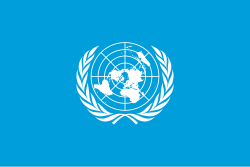This article needs additional citations for verification .(January 2026) |
| United Nations Day | |
|---|---|
 | |
| Official name | United Nations Day |
| Also called | U.N. Day |
| Observed by | United Nations |
| Type | United Nations organization |
| Celebrations | Meetings, discussions, exhibits, cultural performances |
| Date | 24 October |
| Next time | 24 October 2026 |
| Frequency | annual |
| Related to | World Development Information Day |
| This article is part of a series about the |
| United Nations |
|---|
 |
| Charter |
| UN System |
| Funds, programmes, and other bodies |
| Specialized agencies |
| Membership |
| History |
| Resolutions |
United Nations Day is an annual commemorative day, reflecting the official creation of the United Nations on 24 October 1945. In 1947, the United Nations General Assembly declared 24 October, the anniversary of the Charter of the United Nations, to "be devoted to making known to the people of the world the aims and achievements of the United Nations and to gaining their support for" its work. [1]
Contents
In 1971, the United Nations General Assembly adopted a further resolution (United Nations Resolution 2782) declaring that United Nations Day shall be an international observance or international holiday and recommended that it should be observed as a public holiday by United Nations member states. [2]